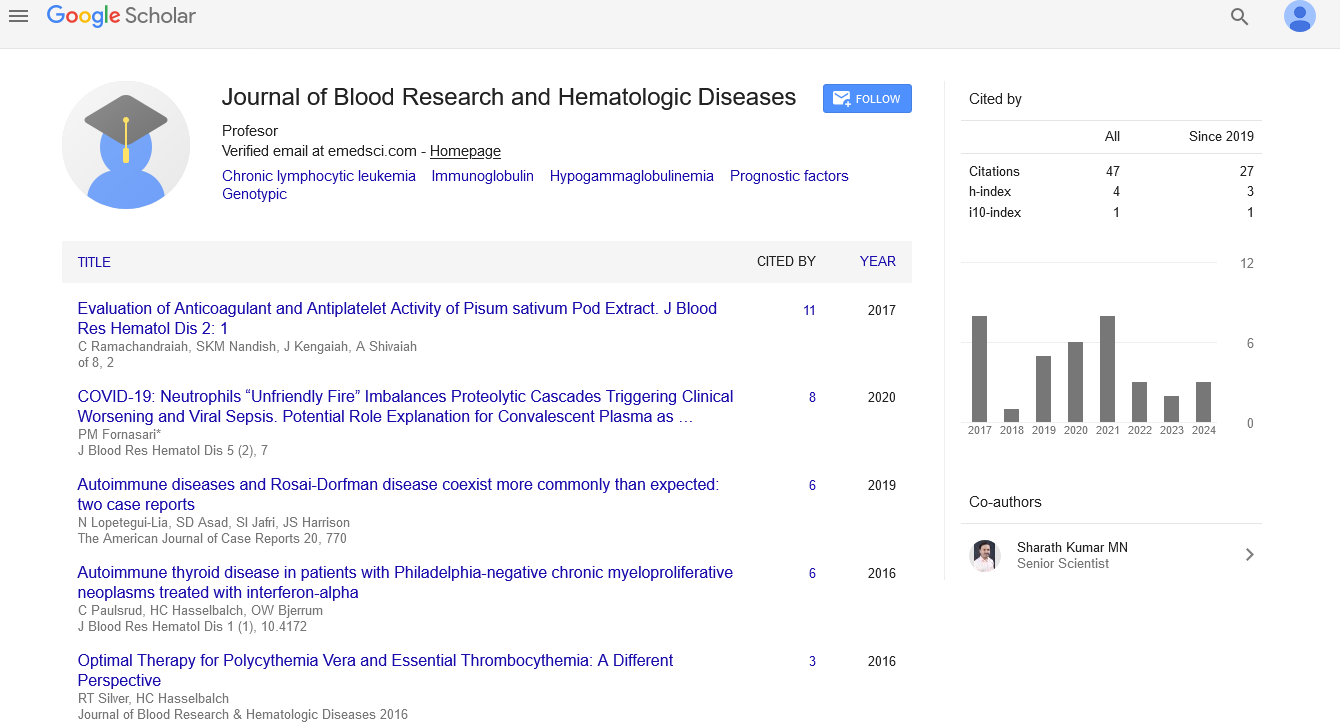Perspective, J Blood Res Hematol Dis Vol: 8 Issue: 2
Understanding Haematology, Treating Blood Disorders, and Enhancing Patient Care
Fares Taie*
1Department of Medical Oncology, University of Ottawa, Ontario, Canada
*Corresponding Author: Fares Taie,
Department of Medical Oncology, University of Ottawa, Ontario, Canada
E-mail: taief123@gmail.com
Received date: 29 May, 2023, Manuscript No. JBRHD-23-106810;
Editor assigned date: 31 May, 2023, PreQC No. JBRHD-23-106810 (PQ);
Reviewed date: 14 June, 2023, QC No. JBRHD-23-106810;
Revised date: 21 June, 2023, Manuscript No. JBRHD-23-106810 (R);
Published date: 28 June, 2023, DOI: 10.4172/jbrhd.1000173
Citation: Taie F (2023) Understanding Haematology, Treating Blood Disorders, and Enhancing Patient Care. J Blood Res Hematol Dis 8:2.
Description
Haematology, derived from the Greek words "haima," meaning blood, and "logos," meaning study, is a specialized branch of medicine that focuses on understanding, diagnosing, treating, and preventing diseases related to blood and its components. This captivating field encompasses a wide range of disorders, such as anaemia, leukaemia, lymphoma, and bleeding disorders, each demanding specialized knowledge and expertise. Haematologists, the medical professionals dedicated to this discipline, play a vital role in managing these conditions and continuously driving advancements in patient care.
Common haematological disorders
Haematology encompasses the study and management of various blood disorders that impact human health. These include:
Anaemia: Characterized by a decrease in the number of red blood cells or their ability to carry oxygen, anaemia can result from nutritional deficiencies, chronic diseases, or genetic disorders. It leads to fatigue, weakness, and other health complications.
Leukaemia: This blood cancer primarily affects the bone marrow and lymphatic system, leading to uncontrolled production of abnormal white blood cells, compromising the body's ability to fight infections.
Lymphoma: A cancer affecting the lymphatic system, lymphoma involves the abnormal growth of lymphocytes, a type of white blood cell. It can be categorized as Hodgkin lymphoma or non-Hodgkin lymphoma.
Bleeding disorders: Conditions like haemophilia and von Willebrand disease are characterized by impaired clotting factors or platelet function, leading to prolonged or spontaneous bleeding, even after minor injuries.
Diagnostic techniques in haematology
Haematologists employ various diagnostic techniques to assess blood disorders and provide accurate diagnoses. These include:
Complete Blood Count (CBC): Providing essential information about the number and types of blood cells present, CBC helps detect anaemia, infections, and certain cancers by measuring red blood cells, white blood cells, haemoglobin levels, and platelets.
Blood smear: Examination of a thin layer of blood under a microscope allows for assessing the size, shape, and distribution of blood cells, helping in the diagnosis of blood disorders through cell morphology analysis.
Bone marrow aspiration and biopsy: These procedures involve obtaining a sample of bone marrow to assess its cellular composition and identify abnormalities, aiding in the diagnosis of certain disorders.
Advancements in haematological treatments
Haematological disorders are treated through a multidisciplinary approach, often involving a combination of medication, transfusion therapy, chemotherapy, radiation therapy, and stem cell transplantation. The field has witnessed remarkable advancements, leading to improved patient outcomes and quality of life. Some notable developments include:
Targeted therapies: Revolutionizing the treatment of haematological malignancies, targeted therapies specifically focus on cancer cells while sparing healthy cells, minimizing side effects and enhancing treatment efficacy.
Immunotherapies: Innovative treatments such as immune checkpoint inhibitors and Chimeric Antigen Receptor (CAR)-T cell therapy leverage the body's immune system to combat certain types of leukaemia, lymphoma, and multiple myeloma more effectively.
Gene editing techniques: The emergence of gene editing techniques like CRISPR opens new possibilities for treating genetic blood disorders, allowing precise modification of faulty genes and offering potential cures for conditions like sickle cell disease and thalassemia.
Conclusion
Haematology plays a pivotal role in the understanding, diagnosis, and treatment of various blood disorders that impact millions of people worldwide. By exploring the intricacies of blood and its components, haematologists provide invaluable insights into these conditions and drive continuous advancements in patient care. Ongoing studies and innovative treatments are paving the way for better therapies, improved patient outcomes, and a deeper understanding of the profound influence blood has on human health.
